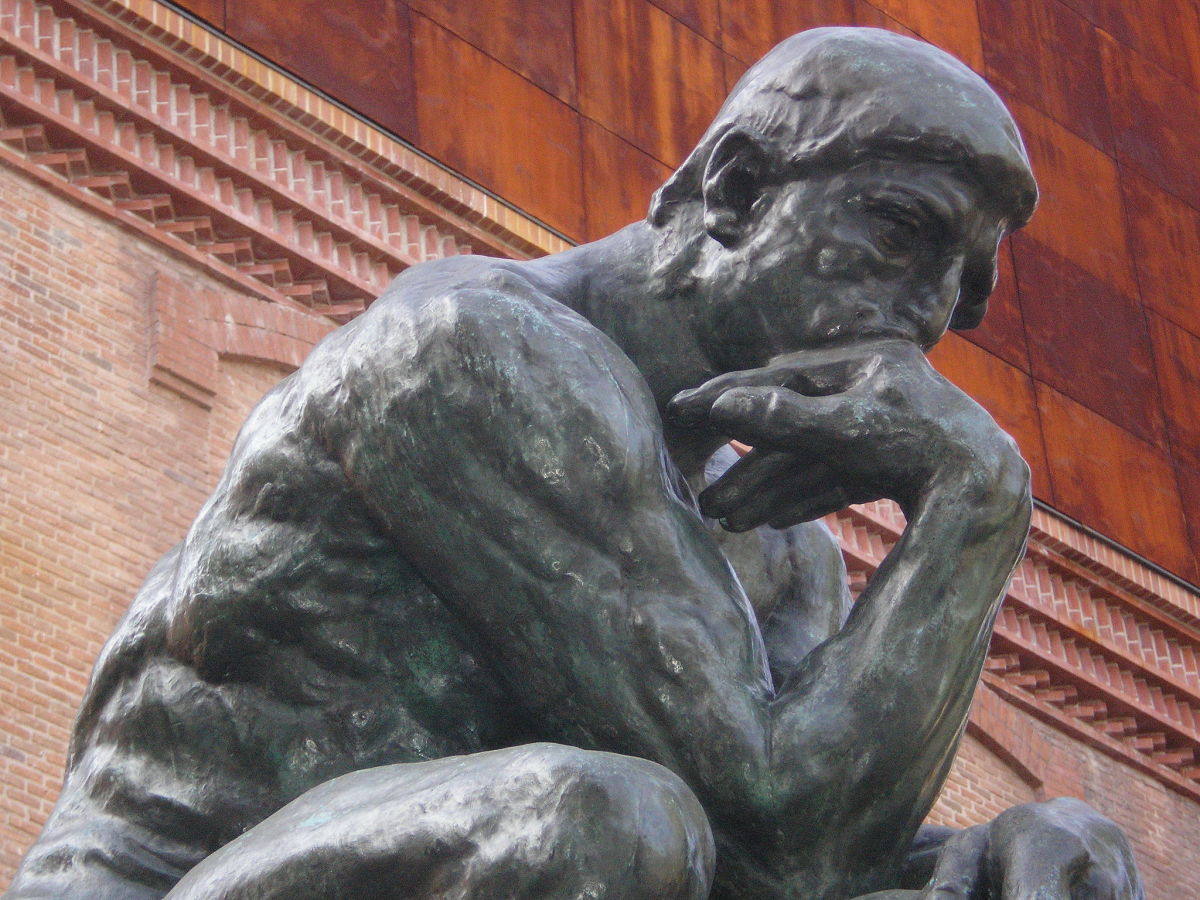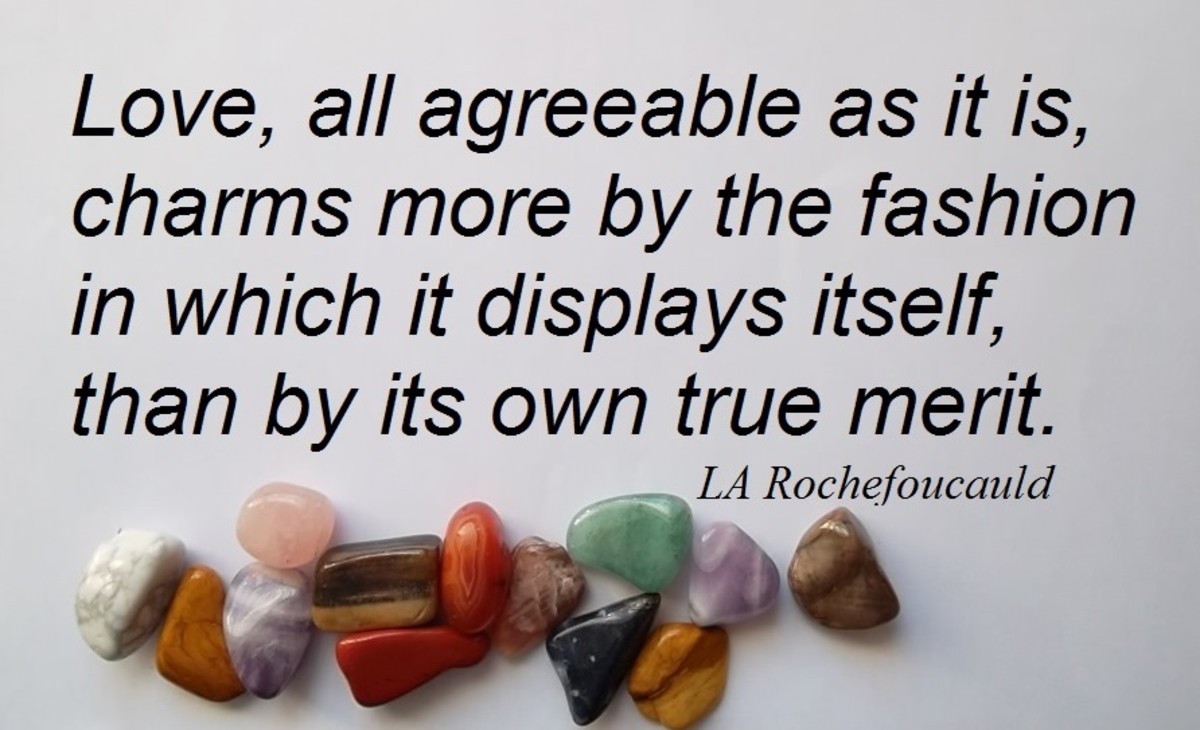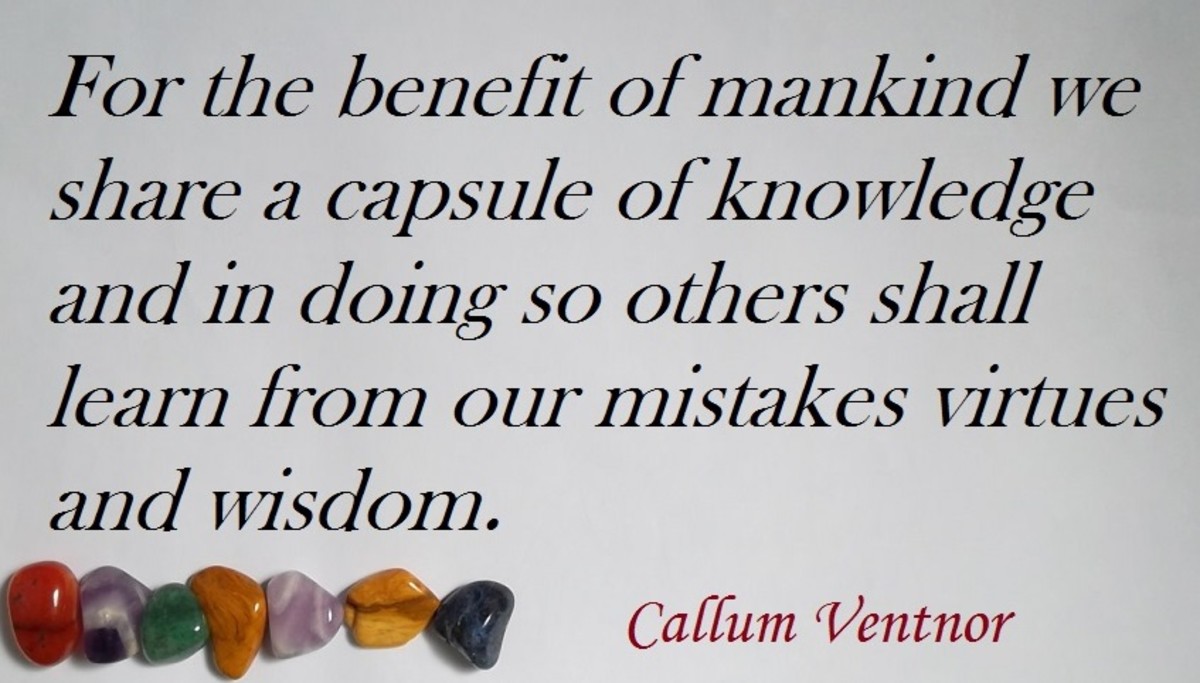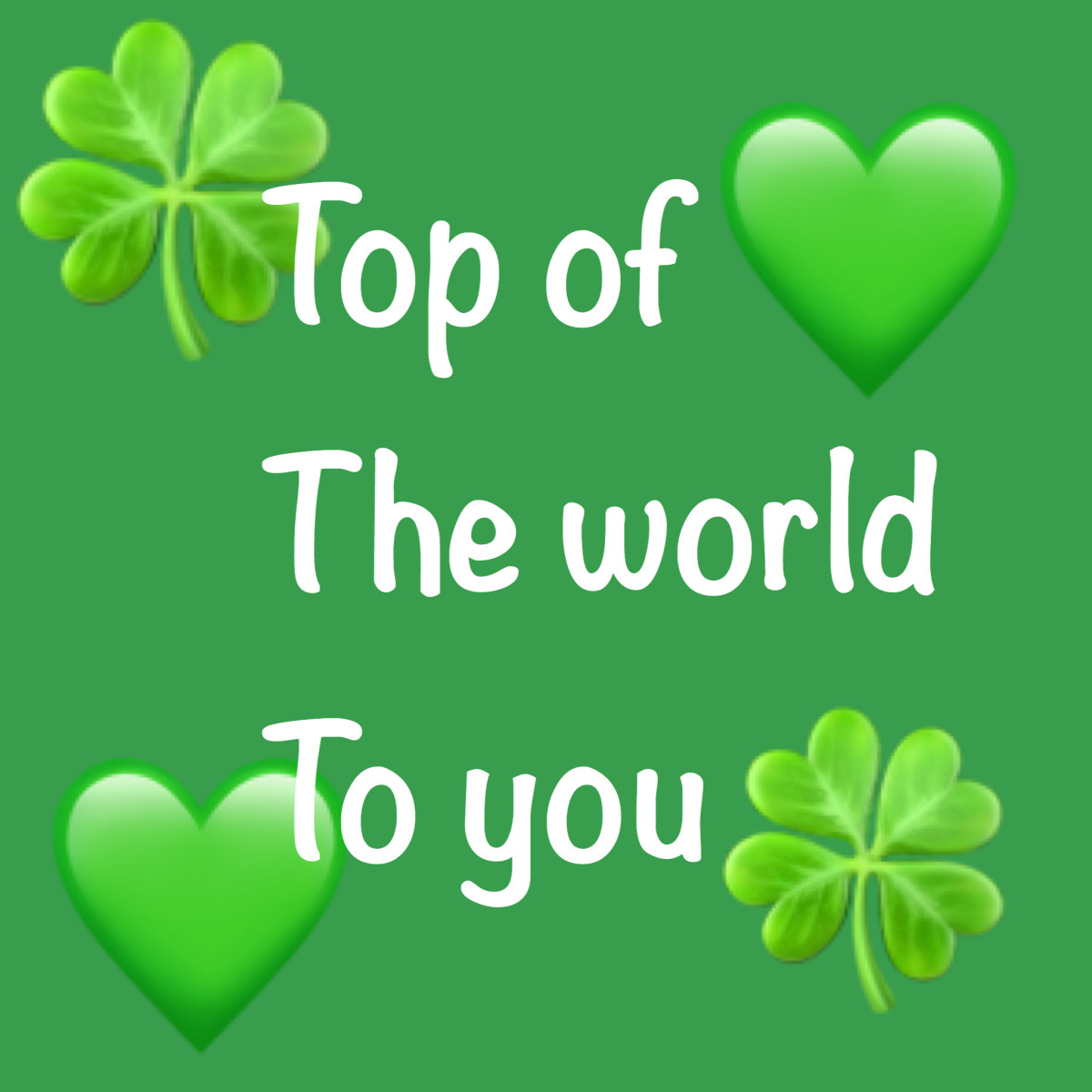Inspirational and Insightful Quotations #20 --- Education
Quotations on Education
Education is the science that helps one to lay hold of his life so that life will not hurt him. This is a homely definition but it contains the vital truth of all practical education.
—J.W. Abel, The Register and Leader, Des Moines, Iowa, May 16, 1910.
Education is an organic whole, a growth in life, an unfolding, a continuous progression of readjustments of the soul to the ever-changing physical and social environment.
—J.B. Aswell, The Daily Picayune, New Orleans, La., Sept. 10, 1906.
Education means to reveal and draw out in development the full talents and capabilities of life.
—John Edward Carver, Ogden Standard-Examiner, Ogden, Utah, May 25, 1925.
Your education is of supreme worth not because it will enable you to get more out of life but because it will enable you to put more into life.
—Arthur Jeremiah Roberts, Lewiston Evening Journal, Lewiston, Me., June 14, 1924.
The great object of an education, the highest meaning of a vocation, should be to increase mental power and executive ability. To be educated is not merely to be able to repeat things like a parrot, but to grasp principles with vigor, to analyze, to synthesize, to think constructively, logically, and apply theory in successful practice. ... True education is a system of self-revelation, a plan whereby one is assisted to take an inventory of oneself, of one's resources.
—Orison Swett Marden, The Chicago Daily News, Chicago, Ill., Oct. 4, 1918.
It is not absolutely necessary that an education should be crowded into a few years of school life. The best educated people are those who are always learning, always absorbing knowledge from every possible source—and at every opportunity. If we go through life with an interrogation point, holding an alert, inquiring mind toward everything, we can acquire great mental wealth, wisdom which is beyond all riches.
---Orison Swett Marden, Success Magazine, New York, N.Y., December 1906.
The purpose of an education is twofold‑‑to train for life making and for living making.
‑‑‑Orison Swett Marden, The Chicago Daily News, Chicago, Ill., July 8, 1916.
Education should lead out, not force on.
---Elijah Powell Brown, Guthrie Daily News, Guthrie, Okla., May 9, 1894.
People used to speak of finishing their education. Intelligent people do not speak that way today; we know that every day of human life ought to be a day of education, and if it is not we lose some of the beauty and power of that day.
---Edward Howard Griggs, Jamestown Evening Journal, Jamestown, N.Y., Aug. 15, 1902.
It is one of the failings of our system of education that it does not emphasize enough the need for independent thinking. For it is not learning an accumulation of facts that helps one but learning a few facts and digesting them. Great men have become great not because of the extent of their knowledge but because of the clearness and individuality of their thinking.
---Terry Walter, Evening Independent, St. Petersburg, Fla., Jan. 7, 1929.
Education is knowing what you want, knowing how to get it, and knowing what to do with it after you get it.
---Billy Sunday, Pittsburgh Press, Pittsburgh, Pa., Dec. 5, 1913.
The end of education is not merely to gain a knowledge of facts; it is culture, and culture has been well defined as the power of appreciation of the good, the beautiful and the true.
---Cameron J. Davis, Buffalo Evening News, Buffalo, N.Y., June 23, 1913.
Education will get you nowhere if you don't dilute it with the correct proportion of common sense.
---Bert Moses, Lake Charles American Press, Lake Charles, La., Jan. 13, 1947.
Education is a leading out, an encouragement of self-expression and self-realization.
---Lucius W. Nieman, Milwaukee Journal, Milwaukee, Wis., Sept. 9, 1918.
Education is getting bearings aright on the sea of life.
---William E. Vaughn, The Acorn, Ogden, Utah, November 1907.
True education is to learn to smile through bitter disappointments.
---William E. Vaughn, The Acorn, Ogden, Utah, November 1907.
Education gives a proper foundation to our lives. Good education is that which develops our vision and enlarges our outlook. It is a refining process. Education becomes impregnated in the whole structure of man.
—Stephen L Richards, Y News, Provo, Utah, May 23, 1923.
If we could look upon education as an adventure in understanding life, we would have a larger meaning.
—Joseph Fielding Smith, Jr., Ogden Standard-Examiner, Ogden, Utah, March 2, 1936.
I believe in applied education. Truth is of little value unless it is applied.
—John A. Widtsoe, Y News, Provo, Utah, Jan. 25, 1922.
Education, in all that is useful, so obviously underlies true human progress. Impress upon the minds of both old and young, the importance to diligently seek useful information from every available source, at all times and under all circumstances.
—Brigham Young, Deseret Evening News, Salt Lake City, Utah, Nov. 25, 1873.
Education is the handmaid to honest labor.
—Brigham Young, Deseret News, Salt Lake City, Utah, Oct. 22, 1862.
Education is the first line of defense for democratic government. Education is the foundation guarantee for the value of future citizenship.
---Jack Williams, Sr., Waycross Journal-Herald, Waycross, Ga., Feb. 10, 1939.
It is education that will give to [people] of the future the vision to select accurately the things to which they should give first place in their lives. It is education that keeps people from being content to remain ignorant. It is education that keeps people from being reactionary and dreading change. It is education that makes a people determined to be free. It is education that enables a people early to sense that which endangers freedom. It is education that enlarges vision, concretizes possibilities, uses abilities, enhances attributes, broadens character.
---Jack Williams, Sr., Waycross Journal-Herald, Waycross, Ga., Nov. 9, 1939.
It needs to be pointed out that an educated man is not a walking encyclopedia. Such a man is merely a prodigious memory. An educated man is one who knows where needed information may be found and who possesses the intellectual alertness to obtain the information needed. That is but one of the qualities of an educated man but a man handicaps himself if he measures his education by the amount of information he has at any one time.
---Jack Williams, Sr., Waycross Journal-Herald, Waycross, Ga., Nov. 6, 1941.
Education, if it means anything, must mean the assistance of the person in getting the right view of his work and of its relation to humanity.
‑‑‑George M. Vincent, The I.S.C. Student, Ames, Iowa, March 9, 1908.
To rightly educate is to draw out all that is good and to repress all that is evil in the character. It is to form habits of study, application and observation and to arouse all the dormant faculties.
---W.H. Collins, Vermont Phoenix, Brattleboro, Vt., July 4, 1884.
Education is more than a preparation for life; it is a life.
---Henry F. Cope, Lincoln County Leader, Toledo, Ore., Aug. 11, 1905.
Education means not so much what is put into the mind as what is drawn out of it—the training of people to think.
---J. Frank Williams, El Paso Morning Times, El Paso, Texas, Jan. 22, 1917.
The seven colors of the spectrum of education are the training to think, to observe, to speak, to act, to direct, to feel and to be.
---Amos R. Wells, The Daily Argus, Mount Vernon, N.Y., Sept. 12, 1914.
The first symptom of an educated man is his enthusiasm for useful employment.
---Roy L. Smith, Tampa Morning Tribune, Tampa, Fla., June 23, 1936.
A man endowed with a desire for knowledge will educate himself.
---Roy L. Smith, Tampa Morning Tribune, Tampa, Fla., July 8, 1936.
The greater part of education is usefulness.
---Roy L. Smith, Tampa Morning Tribune, Tampa, Fla., Dec. 28, 1936.
A real education does not give you something—it develops what you have.
---Roy L. Smith, Buffalo Courier-Express, Buffalo, N.Y., Feb. 17, 1928.
There is no better sign of an educated man than his desire for more knowledge.
---Roy L. Smith, Buffalo Courier-Express, Buffalo, N.Y., Feb. 4, 1933.
Educate yourself! The mind foggy at forty will soon be an old fogy.
---John Wesley Holland, The Recorder, Catskill, N.Y., Nov. 14, 1930.
Learning is acquired, education is a growth.
---W.C. Batchelor, Waycross Journal-Herald, Waycross, Ga., May 18, 1933.
Education is not that which enables us to make our living without hard work, but that which equips us for more efficient work.
---Will R. Howell, El Paso Herald, El Paso, Texas, June 30, 1913.
The difference between a stuffed mind and the educated mind is the difference between the power of memory and the power of reason.
---J. Marvin Nichols, Gainesville Daily Sun, Gainesville, Fla., Nov. 27, 1906.
No really educated man ever has a closed mind.
---Burrows Matthews, Buffalo Courier-Express, Buffalo, N.Y., Dec. 17, 1930.
Education gives that understanding of life and the world that helps one to fill his place. The universe is the school room and every man the teacher. Every man is my superior in some respect.
‑‑‑James P. Burling, The Register and Leader, Des Moines, Iowa, June 20, 1910.
Education consists of a higher intelligence, touching and quickening lower intelligence and lifting them up to its platform and showing them its broader visions.
---Adna Wright Leonard, Berkeley Daily Gazette, Berkeley, Calif., May 9, 1921.
Education does not consist merely in memory and enlightening the understanding; its chief
function is to direct the will.
-‑‑Bruno Lessing, The Monroe News‑Star, Monroe, La., April 1, 1929.
Education does not consist in learning things alone, but in opening mental channels through which the pulsing currents of infinite, progressive possibilities may flow and leave their fructifying silt.
‑‑‑W.A. MacKenzie, Florida Times‑Union, Jacksonville, Fla., Sept. 12, 1923.
Education builds good roads through the mire of ignorance and sets lights of knowledge to replace lamps of guess.
‑‑‑W.A. MacKenzie Florida Times‑Union, Jacksonville, Fla., Jan. 24, 1924.
Education does not consist in pouring facts into the hopper of the head, but in cultivating the intelligence for the seeds of truth.
‑‑‑W.A. MacKenzie, Florida Times‑Union, Jacksonville, Fla., Jan. 31, 1925.
Education is the development of the capacity for beautiful thought.
‑‑‑W.A. MacKenzie, The Leesburg Morning Commercial, Leesburg, Fla., June 28, 1927.
The greatest good that can come into any human life through the process of education is a personal richness of beauty.
‑‑‑Thomas B. Clark, ChiIdress Index, Childress, Texas, May 24, 1921.
The untrained mind cannot beat the trained mind, all other conditions being equal. The fact that men are determined to get educational advantages is the explanation of some remarkable careers. Education is not like cement; you don’t plaster it on. It is the bringing out of the riches within our soul. If you want to pay the price, few things are beyond your reach.
---S. Parkes Cadman, Brooklyn Daily Eagle, Brooklyn, N.Y., Dec. 1, 1930.
Education should be thought of first of all as being a process of making a man more and more of a man through the entire circumference of his possibilities, and not simply along lines that may happen to be most congenial to his tastes, or that will have a larger money of value when taken out into the market of professional or mercantile life.
---Charles H. Parkhurst, New York Times, New York, N.Y., Oct. 27, 1902.
It is one of the deep principles of education that only when the mind works is there learning, only when the will operates is there training. The best service that any institution or any teacher can give is to put into operation the forces by which the individual educates himself. The real work must be done by the individual. All the greatest educator can do is to awaken the forces by which the individual educates himself.
—Bryant S. Hinckley, Deseret News, Salt Lake City, Utah, May 30, 1925.
Education is not mere book learning nor mere intellectual development. It is not merely a means of advancement in life. It means the full‑rounded development of self, the largest growth in a symmetrical way of the individual.
‑‑‑Charles T. Alexander, The Baptist Chronicle, Alexandria, La., Jan. 15, 1914.
The aim of a real education is the proper appreciation of values, the undimmed ability to put first things first. And after all, this is the real purpose of life; that is what we are here for‑‑to put first things first. The meaning of a true education is wisdom producing the appreciation of values.
‑‑‑Richmond P. Bond, Baptist Education Bulletin, Birmingham, Ala., October 1920.
Education is that process whereby the capacities of the individual are developed and refined so that he is able to live effectively with himself and with his fellowmen. ... Education is not a mere transference of intellectual relics from mind to mind; it is not lifeless verbalism; it is not merely an ascetic search for abstract truth. It is the illumination of all the worlds in which one must live his life and the development of the skills to live in them.
‑‑‑Leonard A. Duce, The Southern Baptist Educator, Waco, Texas, March 1949.
"If an individual is to become his own best self, he must constantly be in contact with the best that is in humanity." Education is the process whereby one comes to appreciate the best that men in all ages have learned and thought and felt and said. One cannot rise in stature by pulling at one's own bootstraps. One grows by extending one's self after the ideas and ideals of the great who have blazed the trail. The great have themselves done this very thing. Indeed, they are called great because they have succeeded in unusual measure in gathering up "the best that is in humanity" and conveyed it in some impressive and attractive way to the rest of us. Education may be defined as the process by which one comes into the habit of giving his best self a good chance.
‑‑‑J.A. Hill, Canyon News, Canyon, Texas, May 10, 1962.
It is the purpose of education to build a perfect man, stalwart and strong, and poised. The function of knowledge is to fit a man for actual life and to enable him to understand and take part in the daily business of common affairs. Culture is not pigeonholed data. Education is insight added to eyesight. Nothing can take the place of a concentrated purpose and unwavering aim. A life without a definite end scatters its energies and dissipates its powers. The value of knowledge is not so much in quantity as in the good uses to which it may be put.
‑‑‑William Forney Hovis, Milwaukee Sentinel, Milwaukee, Wis., Dec. 6, 1920.
Education will draw out your latent powers and bring to the front the best in you. You have nothing to fear as far as success is concerned if you have a good education. In all your getting, get an education. It will make you a service of the public and a benefactor of the human race. Have a purpose. Have the current of a great purpose sweeping through your being. Don’t be driftwood. Have a port in view. Fasten your mind upon one thing, and go for it. Go for it till you get it. Concentration of purpose is absolutely necessary to success. May the current of a great purpose turn in your zone and set it on fire with a desire to be a master of one work. Be sure you are adapted to your work. In choosing your work see that it is best adapted to your talents and peculiarities. There is much more satisfaction in being successful in the humbles vocation, than to come in possession of a lofty station for which you are not the least adapted and fail, much to your disgrace and to the mortification of your friends. Other things being equal, you will succeed in proportion as you are adapted to that which you undertake to do. Perseverance. Start and don’t stop. If you fall down, get up and start again. Go on and keep going on.
---Isaac Peart, Bemidji Daily Pioneer, Bemidji, Minn., May 27, 1907.
True education, the education for which the world is ripe, is unfoldment, calling out the germs of possibilities, developing original force, fostering self-reliance, encouraging and stimulating initiative power and executive ability, cultivating all the faculties, and exercising, strengthening, and buttressing them.
We want leaders and originators more than we want followers or imitators. We have enough, and to spare, of those who are willing to lean on others. We want our young people to depend on themselves. We want them to be so educated that their qualities of leadership, their originality, and their individuality will be emphasized and strengthened instead of obliterated.
Self-assertion, the spirit of independence, the courage, the manhood which respects its own powers and is determined to rely upon them, and belief in oneself, the qualities which characterize a leader, can be cultivated by every human being. But if these qualities are not drawn out in youth they may forever lie dormant in the soul. …
It is not the great scholar, who is brimful of facts and theories, but the practical man, who knows what he ought to do and who will do it, who deals with conditions, not theories, and who can bring about results, that is in demand everywhere.
Education is not a stuffing of the memory with facts and theories until it becomes like an unwieldy encyclopedia or dictionary that cannot be handled with ease. A really educated man is not loaded down with textbook information that he cannot put into practice. He knows how to utilize every bit of his knowledge. His education gives him executive power, and makes him master of himself, with ability to manipulate perfectly all the powers that God has planted in his soul. The man who is rightly educated will never be a leaner, imitator, or follower. He may not, necessarily, be a great leader, but he will not seek his opinions from others; he will trust his own judgment, will pilot his own bark, no matter how rough or troubled the waters, will be himself, and will live his own life, wherever his lot may be cast.
---Orison Swett Marden, Success Magazine, New York, N.Y., November 1905.
Education is the capacity to think properly, and to think properly means to speak and to live properly. Education is not intended to enable its possessor to live without working, but to qualify him for being of the greatest service. Better no education than to use it for selfish purposes. Education is not meant to live better than others, but to live better for others. Nothing is so destructive or so costly as ignorance.
‑‑‑DeWitt McMurray, Dallas Morning News, Dallas, Texas, Feb. 10, 1923.
Education is usually a continuation of interest. Interests have to be implanted and developed, like everything else that grows. Persons who do not take kindly to education usually lack imagination. Those experienced by a broad acquaintance with various phases of life find their mental appetites continually whetted and thus keep intellectually or mentally active. The history of great men usually stresses the cultivation of new interests late in life. Longing for more intellectual worlds to conquer is characteristic of the maturing, distinctive personality. If taking an interest in new things is one way of growing old gracefully, then resting, rocking-chair fashion, on one’s mental laurels is one way of growing old disgracefully.
---Burrows Matthews, Buffalo Courier-Express, Buffalo, N.Y., May 12, 1935.
Even a materialistic vision to get the most out of life cannot reasonably overlook the logic of self-advancement through education. Mental development is as logical as physical growth and, for individuals to fit into life and to take their place among their fellows on a competitive footing, it is obviously necessary to be in a position to match with other minds rather than mere wits, and intelligent appreciation rather than mere desire or ambition. The uneducated and the casually educated are more or less handicapped in life, and there will always be times when their underprivileged situation may fill them with certain regrets, if not actual embarrassment. The call of education is to those who want to belong to spheres of life wherein things move more briskly, concepts develop interestingly and the complications and challenges of existence are met with more than average confidence. Education underscores the romance of living, although it signalizes the growing pains of individuality. We can only learn comparatively a very little, after all; but getting somewhere with the adventure of living is always considerably accelerated with the momentum of mental development.
---Burrows Matthews, Buffalo Courier-Express, Buffalo, N.Y., Sept. 8, 1935.
All education is self‑education. That's so simple it may pass by us like so many profound thoughts which we readily give assent. Yet, from whatever viewpoint we define education we, in the last analysis, reach the conclusion that all education is self‑education. This doesn't discount institutional provisions which assist students in getting an education. It does magnify the part that the individual must play in his own education. But not all the faculties of all the colleges on earth can give a person an education; not all the libraries and laboratories on the globe can of themselves make a person wisest; not all the wealth of all the lands can purchase an education. It's a self‑development, not a gift; an achievement, not a purchase.
‑‑‑Clarence M. Dannelly, The Shreveport Times, Shreveport, La., June 2, 1932.
Education is the fruit of the tree of knowledge.
‑‑‑Green Mountain Gem, Bradford, Vt., January 1843.
Education is the apprenticeship of life.
---University Chronicle, Salt Lake City, Utah, Jan. 28, 1896.
To put all of the emphasis on the value of an education is a mistake in so far as education without inspiration is valueless. Only when you include inspiration as an element of education or one of its byproducts can you rate education above all other advantages. There are educated men, well read and intelligent men who are of little value to themselves or society because they have not that divine spark of inspiration which puts education to work and without which education cannot work.
Education comes to man through reading, talking, listening and thinking. Inspiration comes with it through the right kind of reading, the right kind of conversation and the deep and profound sort of thought. In other words, some literature conveys book learning and other literature proposes only to inspire the reader, to lift him out of his work‑a‑day stupor.
Unknown to many, the human mind, by proper impetus, is capable of kindling the divine spark of inspiration. There are many workmen who are stirring their creative ambitions by daily meditation on the ideals of their occupation and upon the vast possibilities lying dormant in their field of labor. No man ever suffered by imagining his job bigger than it really was. Of such imagining is inspiration made.
Inspiration hitched up to education or just plain knowledge [makes] man, communities, nations, business enterprises and all the great inventive, industrial and commercial marvels.
‑‑‑Panhandle Herald, Panhandle, Texas, Jan. 7, 1927.
The difference between success and failure is often the difference between the mere accumulation of knowledge which we call education and the organization of that knowledge. Many men possessed of very little knowledge have succeeded because they have learned to organize that which they have. Many other men with great knowledge have failed because the mass of information they absorbed in school, in colleges and in life is jumbled and disordered. ...
The ability to use knowledge is more important than the acquiring of it.
‑‑‑Pittsburgh Courier, Pittsburgh, Pa., March 5, 1938.
Education is being a worthy member of society, doing work that will benefit others, contributing to the happiness and welfare of society. Any learning that is not for the benefit of the world may be counted as waste.
—Phil Conley, The Clarion-Ledger, Jackson, Miss., April 2, 1948.
Education is not the accumulation of knowledge or the acquisition of skills. It is rather the development of human power, along with a disposition to use it for social ends. In the final analysis, that education is most practical which leaves the individual student with the most vision. The practical and the ideal come together in any proper conception of the nature of education. We cannot hope through education to guarantee every man a job, even during good times, but we can, through education rightly motivated, guarantee to a vast majority of men a residuum of culture, a philosophy of life--that will enable them to keep their feet on the ground in both adversity and prosperity.
—J.A. Hill, The Prairie, Canyon, Texas, April 17, 1934.
An education was not to instill something into a student’s mind, but its purpose was to bring out what was in the inner soul, so that these finer points in his makeup could be afforded an outlet–a means of expression. No one knows what he really possesses until it is brought out.
—Burris A. Jenkins, Southeast Missourian, Cape Girardeau, Mo., Oct. 13, 1920.
Education is a process of living and not a preparation for living. Education never ends except for those who wish it so. Newton D. Baker said, "The man who graduates today and stops learning tomorrow is uneducated the day after." Life consists of growing and progressing–and an education is something that must be constantly used and replenished and added to. As I see it, the really important thing is that each of you live as full and rich a life as possible; that you fulfill all your own potentialities for good. So many people live below their own capabilities--and is not that the supreme tragedy? I think it is, for it represents an error of omission, rather than of commission, and we all know it is better to try and fail than simply not to try.
—John E. Coxe, Monroe Morning World, Monroe, La., June 7, 1947.
Education is incomplete which does not attempt to relate the growing boy and girl to society and to his world as a constructive and responsible citizen. It will never be enough to equip a growing generation with the technical skill which will enable him to live both within this world and also perhaps will enable him to commute between the planets.
—John E. Hines, Houston Post, Houston, Texas, Jan. 29, 1961.
Education is the drawing out and development of all of one's faculties and powers so that he will become an intelligent, self-supporting, useful member of society.
—J.E. Dillard, Baptist Education Bulletin, Birmingham, Ala., June 1920.
Education swings wide a gate. That gate is Opportunity. Beyond it lies the long winding ribbon of the road of earnest endeavor, weaving its way through the valley of preparation to the crest of the mountain of achievement. The gate is opened for you--but you must be the watchman of your footsteps and keep them ever onward. Some day in the glorious sunset of success spent on mountain top, you will look back and see that despite the thorns the way was very beautiful.
—W.A. MacKenzie, Florida Times-Union, Jacksonville, Fla., Feb. 3, 1923.
Education is a tool not to be used to hammer heads full of facts but to blaze trails for thought to follow.
—W.A. MacKenzie, The Leesburg Morning Commercial, Leesburg, Fla., Jan. 23, 1927.
Education is derived from the Latin word educere, to lead forth or to draw out, and therefore implies not so much the communication of knowledge as the discipline of the mind, the formation of, and regulation of character. In this it should be distinguished from mere instruction which, though good, is only for the accomplishment of some given purpose, as technical training, for instance, may be narrowed down to the mere dollar and cent basis. Education on the other hand is the drawing out of the good qualities within us and the developing of a longing for a fuller and better knowledge of the truth.
—Arthur Domonoske, Autumn Leaves, Lamoni, Iowa, December 1908.
Education is a marriage between experience and imagination.
—Paul Geren, Baptist Standard, Dallas, Texas, March 23, 1957.
Education is the orderly discipline of the mind by which its highest development and most effective service are rendered.
—F.C. McConnell, Christian Index, Atlanta, Ga., June 24, 1920.
Education is the release and development of ability. It is emancipation. The uneducated cannot be free, neither can they realize their maximum use to society.
—Allen Hoben, The Baptist Record, Jackson, Miss., June 25, 1925.
Education is the development and enrichment of personality.
—C.C. Grimes, Canyon News, Canyon, Texas, May 28, 1936.
The great thing in education is keeping the open mind.
—Roy L. Smith, Tampa Morning Tribune, Tampa, Fla., Sept. 20, 1935.
The chief elements of education are development, enlargement and capacity.
—Roy L. Smith, Tampa Morning Tribune, Tampa, Fla., Jan. 25, 1936.
Education is that which fits us for the duties of life. Education is not just studying, passing examinations, getting a diploma. Knowledge alone is not education. We may have vast knowledge about many things but we are not educated unless we know how to use that knowledge.
—H.S. Mobley, Ochiltree County Herald, Perryton, Texas, March 22, 1928.
Education arouses self-consciousness, awakens desire, stimulates laudable ambition, suggests methods and means of self-improvement, furnishes correct standards of judgment, presents lofty ideals of character, suggests vast possibilities of achievement and stimulates to higher endeavor.
—T.J. Morgan, The Atlanta Constitution, Atlanta, Ga., Nov. 18, 1901.
Education is that process whereby a human being enters into some control of himself and of his environments. The process is a self-active one, although it can be stimulated and to a certain extent guided by external forces. The fundamental achievements of the process must be read all along the line in terms of character, sensibility, intellectual vigor, and the fitting of means to ends.
—Josephine Hammond, The Personalist, Los Angeles, Calif., April 1925.
True education is the developing in every right direction of the powers of man to think and act correctly in order that every power and faculty may be used to make a happier and better world.
—Gordon Palmer, Los Angeles Times, Los Angeles, Calif., Feb. 18, 1924.
The word education is derived from the Latin word educare, which means to lead forth, or to develop. Another Latin word closely related to the above is educere, which signifies to draw out, to evolve, or to educe. These imply that the leading idea in education is educing or development; and since life is evolved through its own activity, the following would seem to be a reliable definition: Education is the life process which seeks through self-activity to realize its possibilities. This makes the distinctive idea depend on the activity of life. It seems difficult to escape this conclusion, and, if correct, those definitions which exclude this principle must be considered inadequate. But life cannot exist without suitable exterior conditions, and these must be supplied continuously, and while these are subordinate in importance to life, yet any definition that omits outside influences cannot be accepted as complete. This is an attempt to unite the two phases: Education is a result of internal action and external influences upon the individual directing his life through self-activity towards the realization of its possibilities.
—Mosiah Hall, Salt Lake Herald, Salt Lake City, Utah, April 17, 1899.








